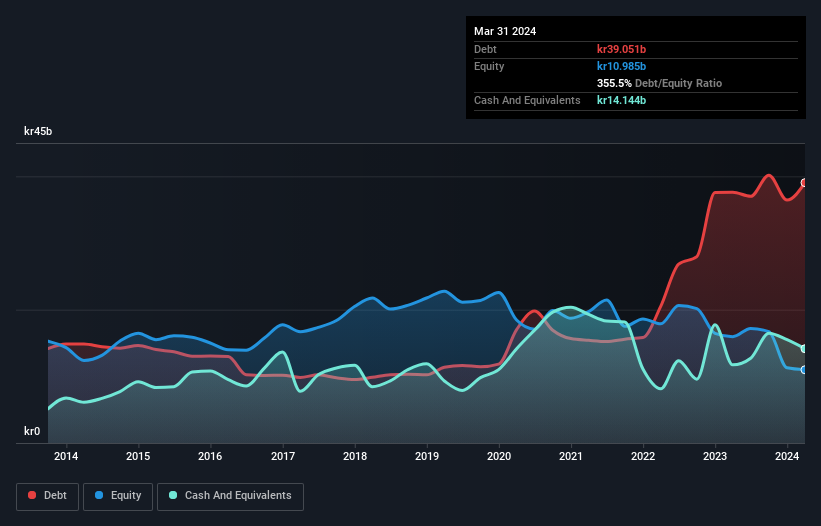- Sweden
- /
- Consumer Durables
- /
- OM:ELUX B
Health Check: How Prudently Does AB Electrolux (STO:ELUX B) Use Debt?
Some say volatility, rather than debt, is the best way to think about risk as an investor, but Warren Buffett famously said that 'Volatility is far from synonymous with risk.' So it seems the smart money knows that debt - which is usually involved in bankruptcies - is a very important factor, when you assess how risky a company is. Importantly, AB Electrolux (publ) (STO:ELUX B) does carry debt. But the more important question is: how much risk is that debt creating?
When Is Debt Dangerous?
Debt is a tool to help businesses grow, but if a business is incapable of paying off its lenders, then it exists at their mercy. Part and parcel of capitalism is the process of 'creative destruction' where failed businesses are mercilessly liquidated by their bankers. While that is not too common, we often do see indebted companies permanently diluting shareholders because lenders force them to raise capital at a distressed price. Of course, debt can be an important tool in businesses, particularly capital heavy businesses. The first step when considering a company's debt levels is to consider its cash and debt together.
See our latest analysis for AB Electrolux
What Is AB Electrolux's Net Debt?
As you can see below, AB Electrolux had kr39.1b of debt, at March 2024, which is about the same as the year before. You can click the chart for greater detail. However, because it has a cash reserve of kr14.1b, its net debt is less, at about kr24.9b.

A Look At AB Electrolux's Liabilities
We can see from the most recent balance sheet that AB Electrolux had liabilities of kr69.5b falling due within a year, and liabilities of kr42.8b due beyond that. On the other hand, it had cash of kr14.1b and kr23.6b worth of receivables due within a year. So it has liabilities totalling kr74.5b more than its cash and near-term receivables, combined.
This deficit casts a shadow over the kr25.1b company, like a colossus towering over mere mortals. So we definitely think shareholders need to watch this one closely. After all, AB Electrolux would likely require a major re-capitalisation if it had to pay its creditors today. There's no doubt that we learn most about debt from the balance sheet. But it is future earnings, more than anything, that will determine AB Electrolux's ability to maintain a healthy balance sheet going forward. So if you're focused on the future you can check out this free report showing analyst profit forecasts.
Over 12 months, AB Electrolux made a loss at the EBIT level, and saw its revenue drop to kr133b, which is a fall of 3.4%. That's not what we would hope to see.
Caveat Emptor
Over the last twelve months AB Electrolux produced an earnings before interest and tax (EBIT) loss. Indeed, it lost a very considerable kr3.6b at the EBIT level. Combining this information with the significant liabilities we already touched on makes us very hesitant about this stock, to say the least. That said, it is possible that the company will turn its fortunes around. But we think that is unlikely since it is low on liquid assets, and made a loss of kr5.9b in the last year. So we think this stock is quite risky. We'd prefer to pass. The balance sheet is clearly the area to focus on when you are analysing debt. But ultimately, every company can contain risks that exist outside of the balance sheet. For example - AB Electrolux has 1 warning sign we think you should be aware of.
If you're interested in investing in businesses that can grow profits without the burden of debt, then check out this free list of growing businesses that have net cash on the balance sheet.
New: Manage All Your Stock Portfolios in One Place
We've created the ultimate portfolio companion for stock investors, and it's free.
• Connect an unlimited number of Portfolios and see your total in one currency
• Be alerted to new Warning Signs or Risks via email or mobile
• Track the Fair Value of your stocks
Have feedback on this article? Concerned about the content? Get in touch with us directly. Alternatively, email editorial-team (at) simplywallst.com.
This article by Simply Wall St is general in nature. We provide commentary based on historical data and analyst forecasts only using an unbiased methodology and our articles are not intended to be financial advice. It does not constitute a recommendation to buy or sell any stock, and does not take account of your objectives, or your financial situation. We aim to bring you long-term focused analysis driven by fundamental data. Note that our analysis may not factor in the latest price-sensitive company announcements or qualitative material. Simply Wall St has no position in any stocks mentioned.
Have feedback on this article? Concerned about the content? Get in touch with us directly. Alternatively, email editorial-team@simplywallst.com
About OM:ELUX B
Fair value with moderate growth potential.
Similar Companies
Market Insights
Community Narratives


Recently Updated Narratives

TAV Havalimanlari Holding will fly high with 25.68% revenue growth


Fiducian: Compliance Clouds or Value Opportunity?


Q3 Outlook modestly optimistic
Popular Narratives


MicroVision will explode future revenue by 380.37% with a vision towards success


The company that turned a verb into a global necessity and basically runs the modern internet, digital ads, smartphones, maps, and AI.



